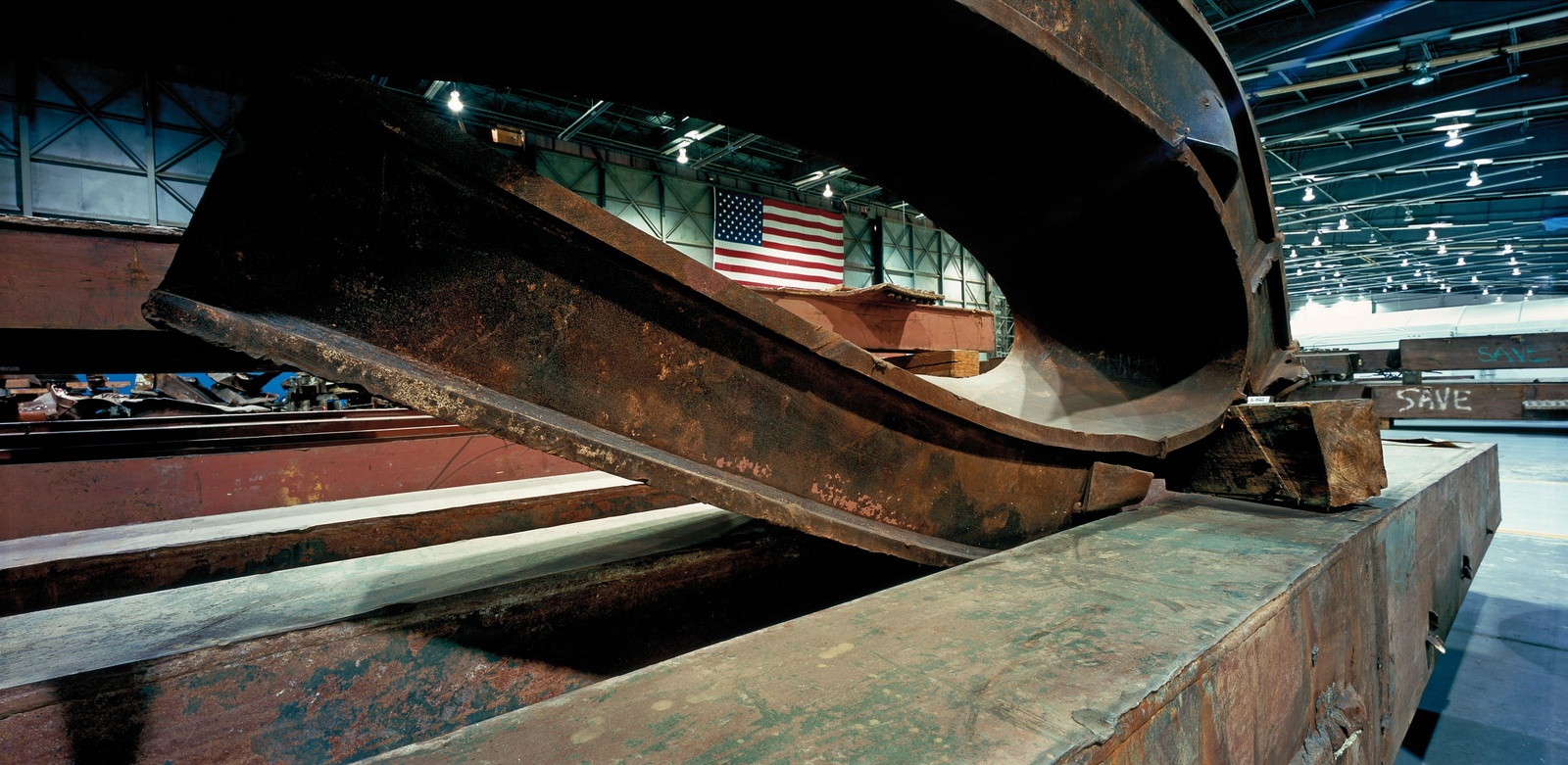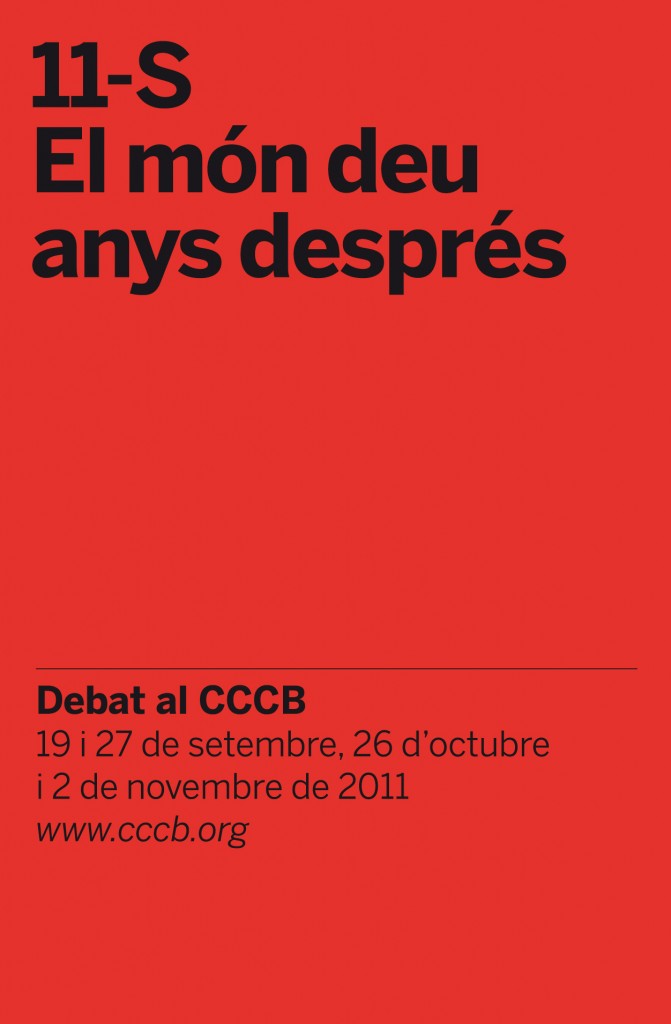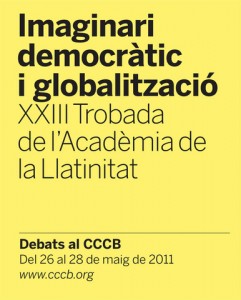Posts Tagged ‘Globalització’
9-11 DEBATES
September 16th, 2011 Elisabet Goula No CommentsThe CCCB commemorates the tenth anniversary of the attacks with an installation by the artist Francesc Torres and a cycle of lectures
This week has seen the tenth anniversary of the 9/11 attacks and the CCCB wishes to join the commemorative events by contributing towards the reflections arising from them. Some days ago, the installation “Memòria fragmentada. 11-S NY Artefactes a l’Hangar 17” (Fragmented Memory: 9/11-NY Artefacts in Hangar 17) by the artist Francesc Torres was inaugurated. This is based on photographs he was able to take several months after the attacks in the hangar at JFK Airport where the remains of the Twin Towers were stored. Off-limits to the public, this space contained more than 1,500 objects of all kinds recovered from Ground Zero, thus inadvertently becoming an improvised museum and the most singular space of memory of the tragedy. In his own words, Francesc Torres’ installation is about “historic memory, national memory, memory of social and individual pain and ways of dealing with deep traumas in order to heal.”
 Photo of the installation Fragmented Memory: 9/11-NY Artefacts in Hangar 17 © Francesc Torres- VEGAP- 2011
Photo of the installation Fragmented Memory: 9/11-NY Artefacts in Hangar 17 © Francesc Torres- VEGAP- 2011
The exhibition is accompanied by a cycle of lectures “11-S. El món deu anys després” (9/11: The World Ten Years On – from 19 September to 2 November) which, in the broadest possible way, offers reflections on the political, social and cultural changes of these ten years with the aim of determining the nature of the legacy the attacks have left us today.
For many people, the heart-rending images of the collapse of the Twin Towers marked the onset of a new stage, as if we had crossed some hitherto unknown boundary and, somehow, nothing would ever be the same again. And it is evident that some things have changed over these ten years: the wars in Iraq and Afghanistan have evolved into conflicts that are very difficult to resolve, while also leaving a terrible bequest of victims who, for the most part, have not had the attention they deserve. In the West, other attacks like those in London and Madrid have had their effects on what could really be the main change in the western world: a new and paralysing sense of fragility that has made discourse on security and the terrorist threat a prevailing theme throughout the decade. The CCCB has been closely following these events over the years and has created its own lines of reflection in analysing them and evaluating their consequences: from the rise of an obsession with security and its dangers for democracies and human rights (“Arxipèlag d’excepcions” (Archipelago of Exceptions, 2005), “L’impacte de l’11-S i l’11-M. Una perspectiva comparada” (Comparing the Impacts of September 11, 2001 and March 11, 2004, 2005), “Mentides globals, violències locals” (Global Lies, Local Violence, 2006)); the impact of the attacks on urban life and public space (“Traumes urbans” (Urban Traumas, 2004), “Arquitectures de la por” (Architectures of Fear, 2007), “L’espai públic en el punt de mira” (Targeted Publics, 2008)); through to the difficulties of resuming an East-West dialogue and understanding the present-day reality of Islam and the Muslim world (“Fronteres” (Borders, 2004), “L’Islam europeu” (European Islam, 2005), “Imaginari democràtic i globalització” (The Democratic Imaginary in the Era of Globalisation, 2011)).
We have been developing these ideas through the years with contributions from local and international experts including Fred Halliday, Michael Walzer, Robert Fisk, Judith Butler, Arjun Appadurai, Gema Martín Muñoz, Georges Corm, Naomi Klein, Zygmunt Bauman, Stephen Graham, Tzvetan Todorov, Faisal Devji and Abdelwahab Meddeb, among many others.
 Now, ten years on from 11 September 2001, with the West immersed in full-blown economic crisis and the Arab world convulsed with revolts in which people are demanding more democracy and more rights, we are offering a new debate on real and imagined transformations, on the world we believed was coming and that has finally become. The sessions include a discussion on the memory of the attacks, with Francesc Torres, Clifford Chanin, director of education and programming adviser of the National September 11 Memorial Museum, which was recently opened in New York, and Montse Armengou, journalist and authority on historical documentaries. There will also be a book launch, of Diari de guerra. Nova York, tardor 2001 (War Diary: New York, Autumn 2001 – L’Avenç, 2011), in which the professor of Art Fèlix Fanés will describe his experiences in New York in the months following the attacks. Also speaking will be Rafael Argullol, professor of Aesthetic Theory, and Mary Ann Newman, essayist and translator. Finally, there are two exceptional lectures that will inform us about two different realities that were profoundly disrupted following the events of 11 September: Pankaj Mishra, the Indian novelist and essayist will discuss how the attacks changed the relations between East and West and, very particularly, the West’s relations with the Islamic world; and the journalist Barbara Ehrenreich, who is well known for her incisive essays on the socioeconomic and cultural reality of the United States, will close the cycle with some thoughts on the effect of the attacks on American society.
Now, ten years on from 11 September 2001, with the West immersed in full-blown economic crisis and the Arab world convulsed with revolts in which people are demanding more democracy and more rights, we are offering a new debate on real and imagined transformations, on the world we believed was coming and that has finally become. The sessions include a discussion on the memory of the attacks, with Francesc Torres, Clifford Chanin, director of education and programming adviser of the National September 11 Memorial Museum, which was recently opened in New York, and Montse Armengou, journalist and authority on historical documentaries. There will also be a book launch, of Diari de guerra. Nova York, tardor 2001 (War Diary: New York, Autumn 2001 – L’Avenç, 2011), in which the professor of Art Fèlix Fanés will describe his experiences in New York in the months following the attacks. Also speaking will be Rafael Argullol, professor of Aesthetic Theory, and Mary Ann Newman, essayist and translator. Finally, there are two exceptional lectures that will inform us about two different realities that were profoundly disrupted following the events of 11 September: Pankaj Mishra, the Indian novelist and essayist will discuss how the attacks changed the relations between East and West and, very particularly, the West’s relations with the Islamic world; and the journalist Barbara Ehrenreich, who is well known for her incisive essays on the socioeconomic and cultural reality of the United States, will close the cycle with some thoughts on the effect of the attacks on American society.
With this lecture cycle we hope to furnish new perspectives to reflections that began ten years ago under the shadow of the unease that has lingered on after the attacks, reflections that we have been building on all this time in order to provide knowledge, horizons and voices that give us a better understanding of our world today.
Gianni Vattimo on universal culture
May 24th, 2011 CCCB No CommentsWith just a few hours to go before the start of the talks on ‘Democratic Imaginary and Globalization’, the VEUS CCCB blog wanted to recall the words of Italian philosopher Gianni Vattimo.
As in the case of Nilüfer Göle, featured in the previous video, Gianni Vattimo is a past visitor to the CCCB, and we wanted to accompany his participation in the debate “The democratic forces emerging under globalization”, this Saturday 28 May, with the reflections he made back in 2007 on the concept of “universal culture”.
Nilüfer Göle on globalization
May 23rd, 2011 CCCB No Comments Coinciding with the arrival in Barcelona of intellectuals to take part in the talks on “Democratic Imaginary and Globalization”, from 26 to 28 May at the CCCB, we wanted to put forward the testimony of some of the speakers who’ll be taking part in this 23rd meeting of the Academia de la Latinidad, which will be reflecting on the future of democracy and political representation in the present-day context of globalization.
Coinciding with the arrival in Barcelona of intellectuals to take part in the talks on “Democratic Imaginary and Globalization”, from 26 to 28 May at the CCCB, we wanted to put forward the testimony of some of the speakers who’ll be taking part in this 23rd meeting of the Academia de la Latinidad, which will be reflecting on the future of democracy and political representation in the present-day context of globalization.
One of the international experts visiting the CCCB this week is sociologist Nilüfer Göle, Director of Studies at the École des Hautes Études en Sciences Sociales in Paris. Göle came to the Centre in the framework of the exhibition “West seen by East” in 2005, which is when we recorded this interview, in which Göle reflects on the inexorable process of globalization and the relations and conflicts between East and West that it generates. In the video, the sociologist comments that any idea of progress must necessarily be linked to the “freedom to choose”.
Nilüfer Göle will be at the CCCB on Thursday 26 May, taking part in the debate “Democracy and Awakening Identities in the Mediterranean” and talking about the challenges presented by Turkey and the democratic rebirth taking place in the area following this spring’s revolutions.







